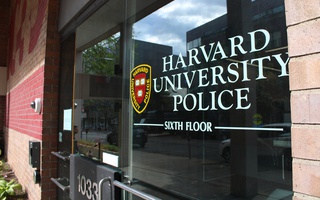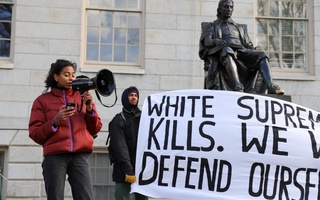{shortcode-d69dcf0b3b6e76de025cb98d1e9fafd51c68cad5}
Within Harvard’s gates, the University maintains its own police force with all the powers of a municipal department — but in many cases, when a call comes in about a crime on campus, officers from that department may not be the only responders.
According to Cambridge Police Department spokesperson Jeremy Warnick and Harvard University Police Department Steven G. Catalano, HUPD and CPD maintain a close, long-standing relationship in Cambridge. Both departments have assisted each other in the past, splitting their jurisdiction based on location and property ownership.
“There is a pretty lengthy relationship in terms how far we go back and a strong relationship between the two agencies,” Warnick said in an interview Monday.
HUPD officers are appointed as special state police officers by the Colonel of the Massachusetts State Police pursuant to Massachusetts General Law. The statute grants HUPD officers the authority to make arrests as regular police officers, granting them authority over land and buildings owned, used, or occupied by the University.
CPD, on the other hand, possesses primary authority over the city of Cambridge, including its schools, campuses, businesses and state roadways, Warnick said.
He added that in certain areas across Cambridge, other agencies — including the Transit Police, Massachusetts state police, and other universities’ police departments — may have primary authority.
“If an incident occurs on Memorial Drive, for example, the agency that has primary jurisdiction over that is the state police,” he said. “If an incident occurs in the Red Line, or with a MBTA bus, the Transit Police have primary jurisdiction over that.”
If incidents take place off campus but involve Harvard affiliates, HUPD will call in neighboring police departments, including CPD, according to Catalano.
“Depending on where they are and what else is occurring on campus officers may respond to their location directly or assist them in connecting with the appropriate jurisdiction,” Catalano wrote in an emailed statement Wednesday.
Warnick added that, when protests and demonstrations take place, CPD has set plans for a variety of “contingencies” in which it might assist HUPD.
“We're always looking to ensure the first amendment rights are being honored by those that are involved, but then also ensuring the safety and security of the area in which these are taking place,” he said. “If those protests, say, for example, became violent, for whatever reason, or became disruptive in a sense that they started to block traffic, you're now on campus, you're now on city property. And now it's becoming a much greater incident.”
CPD may also step in when departments such as HUPD require additional assistance or resources for a particular response, according to Warnick. For instance, he said that if smaller departments like HUPD receive a report of a bomb threat, CPD will assist with its specialized bomb squad as well as its canines unit.
In December, CPD assisted with security during the graduate student union’s strike, billing the University $185,000.
HUPD also occasionally returns the favor, collaborating with other local police departments to ensure “the most appropriate response” to incidents near campus, per its annual security report. For instance, in September 2019, HUPD assisted Cambridge police officers in arresting 12 people protesting at Amazon’s Kendall Square office over the company’s ties to United States Immigration and Customs Enforcement.
—Staff writer Charles Xu can be reached at charles.xu@thecrimson.com. Follow him on Twitter @charles_xu_27.
Read more in News
HCFA Continues to Receive Funding From Parent Group Despite 2018 Requirement to DisaffiliateRecommended Articles
-
 The Old Boys’ Network: Racism, Sexism, and Alleged Favoritism In Harvard’s Police Department
The Old Boys’ Network: Racism, Sexism, and Alleged Favoritism In Harvard’s Police Department -
 Five Takeaways From The Crimson’s Investigation Into the Harvard University Police Department
Five Takeaways From The Crimson’s Investigation Into the Harvard University Police Department -
 HUPD Chief to Launch Internal Review of Department Following Crimson Investigation
HUPD Chief to Launch Internal Review of Department Following Crimson Investigation -
 Student Activists Call for Resignation of Harvard Police Chief, Abolition of Department at Rally
Student Activists Call for Resignation of Harvard Police Chief, Abolition of Department at Rally













